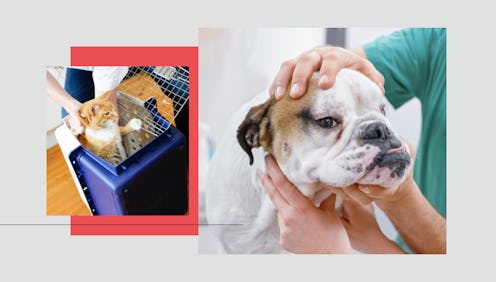
One silver lining of the coronavirus pandemic is that animal shelters and rescue groups are seeing record numbers of pet adoptions. In many cities, shelters are completely empty. If you’re stuck at home indefinitely, a big-eyed fluffball who promises to love you unconditionally sounds pretty good right now. But it also means veterinarians have never been busier.
Among veterinarians, it’s a common joke that people join the field because they love animals and love avoiding humans, says Cherri Trusheim, DVM, a veterinarian who owns Urban Animal, a network of three Seattle-area clinics. Since the pandemic, though, she and other vets have found that the opposite is true. “You have to like people to do this job,” she says.
“This is not a lucrative industry. Everyone works here because they genuinely care. And I think the heightened anxiety levels and emotions are making the job even harder right now,” Trusheim says. “I enjoy connecting with pet owners. I really like that human bond. … It’s harder to do without being face-to-face.”
While her practice was always busy, her clinics have been at maximum capacity several times over the past few months, forcing them to hang signs in the windows asking clients to come back later. That had never been necessary in the Before Times. The network offers telehealth and regular services, but human owners aren’t allowed in-clinic except for euthanasia services. Instead, a team member picks up pets from owners waiting on the sidewalk outside, and the veterinarian calls the owner to provide reassurance that their dog will surely poop out that Lego soon. The lack of actual face-to-face is good for social distancing but more difficult for veterinarians. “It’s a much more challenging way to do the job,” says Trusheim. “It doesn’t feel as personal.”
It’s also been harder to do the nitty-gritty of taking care of an animal. “How can you social distance while you put an IV catheter in a cat? You can’t,” Trusheim says. “We’re trying to find the balance to keep everyone as safe as we can and still do our jobs reasonably.”
To keep her business running safely for her employees, Trusheim says she has had to stop offering some non-essential services, like dog nail trims. “That’s not worth putting our lives at risk for,” she says. It also cuts into their bottom line, just as hospitals are losing revenue by postponing elective procedures.
Small Door Veterinary, a membership-based concierge clinic in New York City, is concerned about dogs and cats, especially recent adoptees, missing their regular vaccines during COVID-19. Certain canine or feline viruses are a threat to human health, such as rabies and leptospirosis. Each state has its own laws on animal vaccination, and most rescues are vaccinated before placement in a forever home. But many of these shots require follow-up boosters, which might not have been completed before the adoption. Pets also need an annual check-up, and just like humans, those visits might be postponed out of fear of going to the doctor’s office right now.
How can you social distance while you put an IV catheter in a cat? You can’t.
Pippy Pelham, Small Door’s marketing lead, is concerned about future abandonments, with new owners unable to care for their new companions if they underestimated the amount of work a rescue takes, or if they fall ill themselves. The American Society for the Prevention of Cruelty to Animals (ASPCA) told The Daily Beast at the end of March they saw a 70% increase in pets going into foster care in New York City and Los Angeles over the same period last year. Pelham is also concerned about people who think their familiars could give them COVID-19. “We’re received many queries regarding the potential risks [of animal-to-person transmission], whether and how they should change their usual routines, and what they can do to protect their pets,” she says. (Any infected domestic animal, of which only five cases have been reported, is more likely to get the virus from their human than the other way around.)
But for those who have opted to become forever homes during the pandemic, feeling supported by their vets has only enhanced their experience of welcoming an animal to their home during unquestionably strange times.
Marissa, 35, adopted a pit mix named Frannie when her city went on a stay-at-home order in March. “At first I was nervous about using a vet, but we found one in the neighborhood who will do pick-up and drop-off at the door and are such big fans of [Frannie’s] that I don’t even worry.”
“The best part is obviously having another living, breathing being in my home. She’s such a snuggler,” Marissa adds.
And it’s those bonds that owners feel with their animals that veterinarians love to help nurture — in person, when possible.
“It’s no mystery that when times are hard, people get a puppy or a kitten because the comfort the human-animal bond provides is so incredible,” Trusheim says. “When times are hard, it’s a priority. And now, not only are we essential, but we’re in demand. … For us, the question is how do we help?”